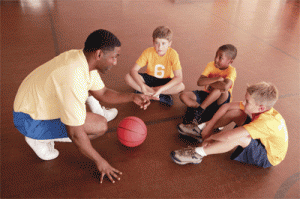 Youth coaches are critical to kids’ sports experiences. They can influence whether young athletes enjoy sports and want to continue to play. Some coaches can get kids excited about sports, while other coaches may discourage kids or take the fun out of sports. A good coach can keep kids’ interest in sports alive.
Youth coaches are critical to kids’ sports experiences. They can influence whether young athletes enjoy sports and want to continue to play. Some coaches can get kids excited about sports, while other coaches may discourage kids or take the fun out of sports. A good coach can keep kids’ interest in sports alive.
What does a good coach look like?
Good coaches are able to put winning in perspective. They realize that winning is not the most important part of sports. They see the importance of striving to win, which may be more important than achieving the win. Good coaches are good teachers. They are knowledgeable about their sport, and know how to teach new skills and strategies. Athletes are better prepared to move up to more competitive levels after learning the correct technique and necessary strategies.
A good coach knows how to motivate athletes. Coaches should be able to recognize each athlete’s strengths and weaknesses, and know how to motivate athletes based on these traits. Good coaches know how to address mistakes without discouraging athletes.
Good coaches push athletes to reach their goals. These coaches are tough, but fair. Coaches lose credibility if they are not tough enough. Athletes may not learn as much when the main focus is only fun.
Coaches can be an adult role model in kids’ lives. They can offer kids advice about school or share life experiences. Coaches teach life skills, not just sport skills. These skills include dedication and cooperation.
Good coaches also encourage teamwork. They realize they are, as coaches, just as important to the team dynamics as the athletes on the team. Good coaches have just as much invested in the sport as the athletes do themselves. These coaches are open to suggestions from athletes about practices, team rules and other areas of the game. Every player’s input is valued. Team goals are an important focus.
Bad coaches can extinguish kids’ love of sports.
They like to play favorites, only focusing on a few skilled players and ignoring the rest of the team. The less skilled players don’t learn new plays or strategies, aren’t given the opportunity to play in games, and don’t learn the necessary skills in practice. These players are more likely to drop out of the sport.
Bad coaches use yelling to put athletes down. This lowers sports kids’ confidence and self-esteem. Kids may feel less excited about sports or that they are not a valuable part of the team.
Bad coaches aren’t good teachers. Their teaching style may cause kids to become frustrated when they can’t execute skills correctly. Kids are more likely to lose interest when they can’t master the skills.
Practices aren’t fun with bad coaches. They continue to do the same boring drills each day. Kids don’t have an input on their practices, either. Kids practice with less intensity when there’s little variety in practices.
In short, it’s important to try to find a coach who’s likely to build success and confidence in your young athlete. Think hard about staying with coaches who hurt your kids’ confidence

























